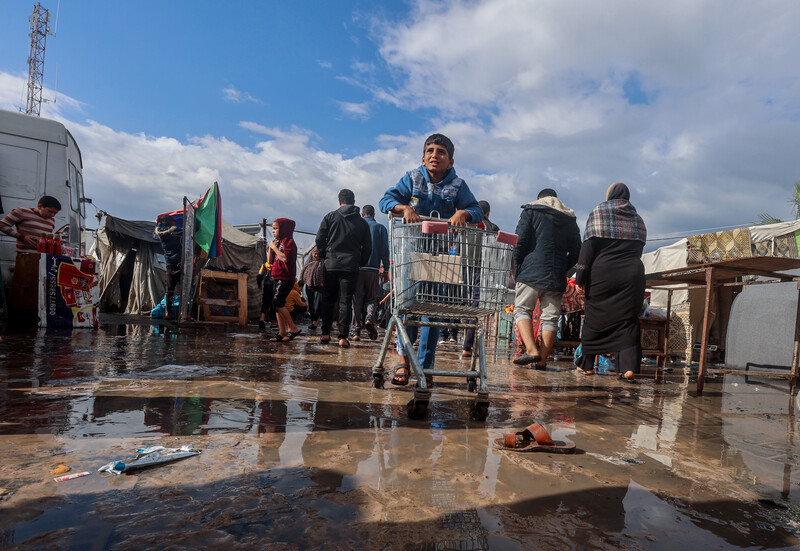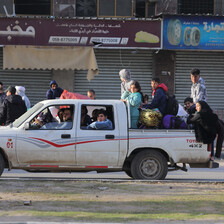The Electronic Intifada 22 November 2023

Hundreds of thousands of Palestinians have sought shelter in UNRWA facilities, including schools, which lack heating systems. (Ahmed Zakot / SOPA Images / Zuma Press)
A few weeks ago, my sister’s friend, who had sought shelter in an UNRWA school in Rafah, expressed gratitude that winter had arrived late this year.
I felt the same way.
I used to like winter. Being the daughter of a farmer, we would always say that winter is kheir, or good.
Winter’s beneficial for the harvest; it brings rain – a divine blessing. Every time it rains, we rejoice. Our livelihoods depend on agriculture, and if the rain does not arrive, the harvest will be insufficient.
In Islam, we have a prayer that requests rain from God. We call it the rain, or drought, prayer. Rain is of the highest significance.
A couple of days ago, it lightly rained in Gaza. Surprisingly, I found myself cursing the rain, praying for it to stop.
Today, it rained again. I prayed for it to stop.
I hate winter
Hundreds of thousands of Palestinians have sought shelter in UNRWA facilities, including schools, which lack AC and heating systems.
When Palestinians were forcibly displaced by Israel, we did not bring winter clothing with us. Our bags that we packed in haste did not contain warm clothing or blankets.
Such bags, we thought, were for a few days, not for an entire season.
But now, winter is upon us.
I hate winter now because it exacerbates the hardships we face, as we sleep outdoors in makeshift tents or in packed classrooms.
Whether one is outdoors or inside, it is cold. Usually in winter, teachers advise students to wear heavy clothes to stay warm at school. They would shut the classroom windows to protect against the wind. This is how it was when I grew up.
However, during wars, we cannot close the windows. When Israeli airstrikes hit us, they shatter the windows, and the glass comes raining down on us.
Without heating indoors, we are all vulnerable to illness, but the elderly, children and those who have pre-existing conditions are most at risk.
Unwelcome sounds
Winter is a time of thunderstorms and lightning.
We may confuse the sound of thunder with bombs. It is frightening how much lightning on the horizon reminds one of the flares that trail behind Israeli weapons.
We might perceive both good and evil as having the same sound.
As someone who has experienced trauma from previous wars, winter storms full of booming thunder already frighten me. Even the sound of a door closing loudly can startle me.
Our homes are piles of rubble, and our loved ones are buried beneath this rubble. What will happen when the rainwater mixes with the debris? Will our streets flood and become unnavigable?
And what of our loved ones’ bodies that we have not yet recovered? Will they decompose above ground and become unrecognizable?
Homes that are partially destroyed, like my own, may collapse in the winter storms. We haven’t had time to rebuild, and our walls are badly damaged.
Even light storms are a setback and a cause for major worry. Like yesterday, when wind blew our water tank off of our roof.
Our neighbor’s rooftop solar panel also blew away. He had repaired the panel after an Israeli airstrike, with no help from any expert or technician. We were all so grateful to be able to use it to charge our devices.
To lose our source of power was a big source of sadness.
Leaking tents
I hate winter now because it is so hard to start an open-air fire.
With the scarcity of cooking fuel, we cook and bake bread on open fires. Rain makes the wood or cardboard damp, and it is difficult to ignite.
Heavy rains and storms might result in leaks and floods inside tents. How will people stay warm and dry? Hypothermia is a risk.
Floods have hit Gaza in the past, and this winter will be no different.
Gaza’s sewage pipes, wastewater treatment plants and drainage networks have been damaged or destroyed by Israeli airstrikes. Our streets will overflow with sewage.
This war has made me hate a season I used to cherish. Though I would rather say I hate war than winter.
Ghada Abed is a journalist based in Gaza.





